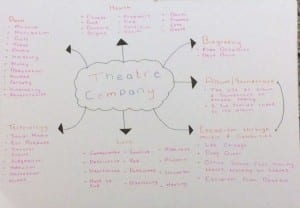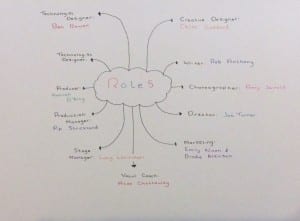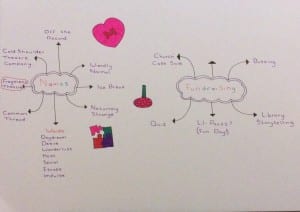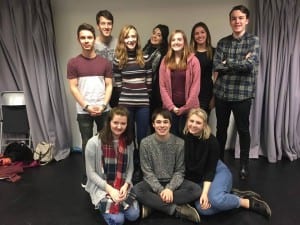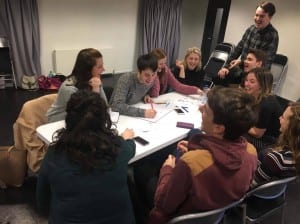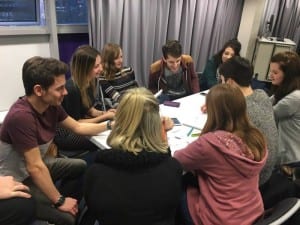The Topic
The 1st of February hit, and the second semester of third year began. Today was the day, 10 students partaking in the theatre company module met for the first time after deciding to create a theatre company together. We began the process by brainstorming any ideas we each had for the final production. We began the discussion by creating an extremely colourful (thanks to me) spider diagram, displaying all our ideas (see Show Idea’s).
(Show Idea’s from Rowan, 2017)
The Spider Diagram was designed to create a foundation of our final production regarding the plot of the show. Our first creation was to create a piece based on a known celebrity biography. Two celebrities which were mentioned in the discussion were David Bowie and Ellen DeGeneres. This then continued to spark more idea’s, and changing it from a show based on a biography, to a production based on an album showing the audience how we use music to escape our reality. We all shared a great liking to the idea of escapism, so discussed on creating 5 characters which each possess individual sub stories and show different ways of escaping reality; “The ultimate “goal” of escapism is the destruction of “self”” (Mikey D, 2014). Each character’s story would be told through a song from a variety of different albums and genres. For example, it was discussed to include a character suffering from an alcohol addiction, and the story will be told through the music created by Amy Winehouse. (Amy Winehouse, 2006). Alongside the character suffering with an alcohol addiction, we created a character confused about his sexuality. Inspired by the musical Chicago (Marshall, 2002), we wanted to tell the story of a man who works a 9-5 office job Monday to Friday and on Weekends is the most fabulous Drag performer.
Continuing the discussion, we decided as a group to keep the idea of escapism, and develop other ideas surrounding the idea of escaping reality. We played a game of word association, saying words which related to escapism and other ways of escaping (see Show Ideas). 1st February 2017 was the day we decided our final production was about escapism and the idea of escaping reality.
Who’s Who?
After creating the topic, it was time to decide our roles within the production. Luckily this did not take long as we all already knew who wanted to do what. The roles can be seen in Job Role’s.
(Job Role’s from Rowan, 2017)
Producer: Hannah D’Arcy
Director: Joseph Turner
Stage Manager: Lucy Workman
Assistant Director: Brodie Atkinson
Marketing: Emily Nixon
Technical Designer: Benjamin Rowan
Props: Phillipa Strickland
Choreographer: Roxy Jarold
Creative Designer: Chloe Goddard
Writer: Rob Anthony & Brodie Atkinson
Performers: Brodie, A. Rob, A. Hannah, D. Chloe, G. Phillipa, S. Emily, N. Benjamin, R. Roxy, J.
#FragmentTheatreForever
Once the roles were decided, it was time for the fun part. It was time (finally) to decide the name of our theatre company. Bringing back the word association game, we wrote a list of words which linked to each idea seen in Image One (see Theatre Company Name’s and Fundraising Ideas).
(Theatre Company Name’s and Fundraising Ideas from Rowan, 2017)
We then picked two words at random to see what name we would discover. We ended up with a variety of different ideas of theatre company names, and after researching if any of the names already existed, we became … Fragment Theatre Company.
(Cast from Fragment Theatre, 2017)
Works Cited:
Amy Winehouse. (2006) Rehab. [CD track] 3 mins. 34 secs. Amy Winehouse Back to Black. New York: Allido Studios.
Efron, Z. Hudgens, V. (2006) Start Of Something New. [CD track] 3 mins. 17 secs. High School Musical (An Original Walt Disney Soundtrack). Walt Disney: United States.
Marshall, R. (dir.) (2002) Chicago. [film] United States: Miramax Films.
Fragment Theatre Company. (2017) Cast.
Mikey D. (2014) Feel Happiness. [online] Available from: http://feelhappiness.com/escapism-leave-fantasy-world-live-reality/ [Accessed 1 February 2017].
Rowan, B. (2017) Show Idea’s.
Rowan, B. (2017) Job Role’s.
Rowan, B. (2017) Theatre Company Name’s and Fundraising Ideas .
